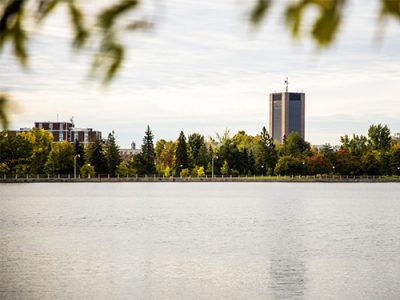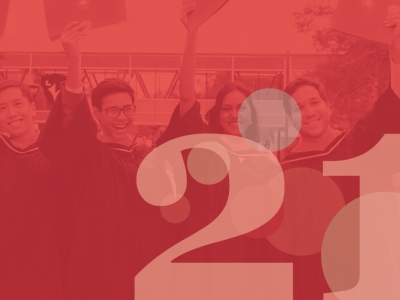By Jena Lynde-Smith
Photos by Brenna Mackay
The strength of our criminal justice system depends on its ability to convict the guilty and to clear the innocent. Despite this, wrongful conviction cases are a regular occurrence – with nearly 4,000 known cases in the United States alone.
Kelly Lauzon, a Carleton University researcher, instructor and staff member, is tackling these ill-fated events through a combined effort of advocacy and education.
“Identifying and understanding the causes of wrongful convictions is critical to ensure that no more lives are destroyed and to maintain the integrity of our justice system,” says Lauzon.

Kelly Lauzon, Carleton University Instructor and PhD student (photo by Brenna Mackay)
Lauzon discovered her passion for the world of wrongful convictions as a Carleton undergraduate student. The spark was lit in a criminology class.
“There was one lecture about wrongful convictions and the professor told us about the David Milgaard case,” Lauzon recalls. “I was infuriated. It challenged everything I had ever thought I knew about the justice system.
“That’s what set me on my path.”
Over two decades later, Lauzon has completed an undergraduate and master’s degree in law and legal studies at Carleton, and is now working on her PhD. Her research is looking at how opening lines of communication among defense attorneys could prevent wrongful convictions.
“I’m investigating how we might be able to implement a central database that compiles information to help defense attorneys keep their innocent clients from conviction,” she says.
Raising Awareness of Wrongful Convictions in Canada
In addition to her research, Lauzon is creating discourse around wrongful convictions in Canada through her podcast, Real Life Wrongs. The show features individuals who have been affected by miscarriages of justice, providing them with an opportunity to tell their story.
“Accounting for those who have been wrongfully convicted is difficult as we only become aware after they have been acquitted or exonerated,” Lauzon explains. “The best way to illustrate the problem is to show its impact on real peoples’ lives.”
There are nearly 100 known cases of wrongful convictions in Canada, as outlined by the Canadian Registry of Wrongful Convictions but for Lauzon, the numbers aren’t what’s important.
“One person’s life is one too many,” she says.

Causes of wrongful convictions in Canada as outlined by the Canadian Registry of Wrongful Convictions
Lauzon’s podcast not only brings to light the impact wrongful convictions has on lives but also speaks to the errors in the justice system that lead to them. One of the most common causes of wrongful convictions is eye witness misidentification. According to the Innocence Project, it was a contributing cause in approximately 70 per cent of convictions overturned through DNA testing in the United States. Factors like the length of time between the incident and making a statement, the way questions are asked, and listening to external news reports, all contribute to bearing false witness.
“Misidentifying someone is rarely done maliciously,” Lauzon says. “People want to help, but our memories are very dynamic. There are also embedded systemic issues.”
Other causes of wrongful convictions include tunnel vision – when prosecutors become fixated on a potential suspect and don’t pay attention to contradictory evidence; faulty forensics – the idea that certain tests run to secure a conviction do not bear a lot of scientific grounds; jail house informants – when an incarcerated individual provides evidence in order to reap a benefit; and perhaps the most shocking, false confessions, which are often the result of poor interrogation practices.
Educating the Next Generation of Justice Workers
Lauzon also teaches these concepts as an instructor with Carleton’s Department of Law and Legal Studies. Her fourth-year special topics class paints a picture of wrongful conviction cases in Canada – a notoriously understudied topic – through storytelling and case studies.

Students in Lauzon’s class are taught the many ways in which guilt can be manufactured through the Canadian justice system (photo by Brenna Mackay)
“My hope is that when these students start in their careers as attorneys, judges and police officers, that they remember what they learned in my course and ensure to check all of their bases before contributing to another case of wrongful conviction,” says Lauzon.
Students in the course are exposed to cases such as that of the late David Milgaard. Milgaard was wrongfully convicted of murder in 1969 at only 16 years old and spent 23 years in prison. They also discuss smaller-scale cases like the conviction of Jamie Nelson who was imprisoned for sexual assault in 1999 and spent three and half years in prison before he was cleared of the charges. Nelson, now a close friend of Lauzon’s, has been a guest lecturer in her class a number of times.

Kelly Lauzon and Jamie Nelson speaking at a University of Guelph Wrongful Conviction Day event last year
“This class is thought provoking, infuriating, and super important,” writes a student on Lauzon’s Rate My Professor profile. “I learned more in this class than I did in any other class that I have taken in four years.”
Lauzon believes that raising awareness is the first step in bringing an end to wrongful convictions in Canada.
“There is still a lot of work to be done,” says Lauzon, “But we’re moving in the right direction.”
“As we work together to continue drawing attention to these miscarriages of justice, my hope is that one day, Canada will stop convicting the innocent.”
Monday, August 28, 2023 in Faculty of Public and Global Affairs, Institute of Criminology and Criminal Justice, IWD 2024, Law and Legal Studies
Share: Twitter, Facebook



